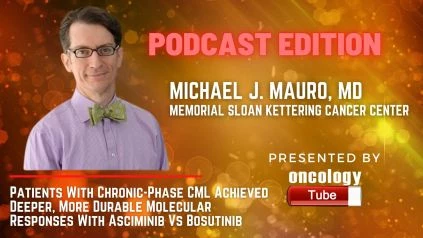Dr. Michael Mauro, leader of the Myeloproliferative Neoplasms Program at Memorial Sloan Kettering Cancer Center. In this video, he speaks about Patients With Chronic-Phase CML Achieved Deeper, More Durable Molecular Responses With Asciminib Vs Bosutinib.
According to updated findings from the phase 3 ASCEMBL trial (NCT03106779) presented at the American Society of Hematology Annual Meeting & Exposition, chronic-phase chronic myeloid leukemia (CP-CML) treated with asciminib (Scemblix) was more likely to achieve major molecular response (MMR) than bosutinib (Bosulif) without any new or worsening adverse effects (AEs).
The MMR rate at 48 weeks was 29.3 percent with asciminib vs 13.2 percent with bosutinib, demonstrating a 16.1 percent difference in favor of asciminib after a median follow-up of 19.2 months. Furthermore, asciminib had a greater BCR-ABL1IS rate of 1% or less than bosutinib, at 42.3 percent versus 19.4 percent, respectively.
Asciminib is a first-in-class BCR-ABL1 inhibitor that operates by inhibiting the myristoyl pocket in the ABL protein.
The FDA granted asciminib expedited approval on October 29, 2021, for individuals with CP-CML who have previously been treated with two or more TKIs. The drug’s use in people with CP-CML with a T315I mutation has also been given full approval by the FDA. 2
The FDA made its decision based on the results of the phase 3 ASCEMBL trial, which looked at asciminib in patients with CP-CML who had previously received two or more TKIs, and the phase 1 CABL001X2101 trial (NCT02081378), which looked at it in patients with Philadelphia chromosome–positive CP-CML who had a T315I mutation.
ASCEMBL included 233 individuals with CP-CML who had previously received at least two TKIs but had failed or were intolerant to them. At the time of screening, patients with intolerance to their most recent TKI required to have a BCR-ABL1IS of at least 0.1 percent.
Exclusion criteria included the existence of T315l and V299L mutations.
For at least 96 weeks, patients were randomized 2:1 to receive 40 mg of asciminib twice daily (n = 157) or 500 mg of bosutinib once daily (n = 76).
Patients who failed to meet the lack of efficacy criteria were compelled to stop treatment; patients who were randomized to bosutinib were only allowed to switch to asciminib if they failed to meet the criteria for lack of efficacy.
The MMR rate at week 24 was the study’s major end point, while the MMR rate at week 96 was a critical secondary end point.
After adjusting for major cytogenetic response at baseline, primary findings from ASCEMBL showed that after a median follow-up of 14.9 months, asciminib led to an MMR rate of 25.5 percent at 24 weeks vs 13.2 percent with bosutinib, indicating a difference of 12.2 percent (95 percent CI, 2.19 percent -22.30 percent; P =.029) in favor of asciminib.

